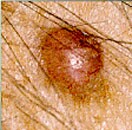
TUESDAY, Nov. 5 (HealthDay News) — Men with prostate cancer may face an increased risk for developing melanoma skin cancer down the road, new research suggests.
The finding stems from a fresh analysis of data involving more than 60,000 patients, prompted by the study team’s observation that roughly 18 percent of cancer diagnoses in the United States today are actually secondary diseases occurring among survivors of prior cancers.
Study author Jiali Han, an associate professor in the department of medicine at Brigham and Women’s Hospital/Harvard Medical School, and colleagues published their results online Nov. 4 in the Journal of Clinical Oncology. The research was funded by the U.S. National Institutes of Health.
The authors noted that in the United States, prostate cancer is currently the most common type of non-skin cancer diagnosis. To explore a potential connection between a history of prostate cancer and subsequent melanoma risk, they pored over two different sets of data.
The first concerned nearly 42,400 men (all white, aged between 40 and 75) who had participated in a study of health professionals between 1986 and 2010. The second involved more than 18,600 patients who had been enrolled in a study of physicians’ health from 1982 to 1998.
Ultimately, the investigating team uncovered nearly 5,100 confirmed cases of prostate cancer among the pool of patients from the health professionals study, alongside 539 instances of melanoma.
After also reviewing prostate cancer and melanoma incidence among the second pool of patients from the physicians health study, the team concluded that men who had been diagnosed with prostate cancer did indeed appear to face a higher risk for melanoma.
By contrast, although the team also observed a relationship between prostate cancer and a higher risk of non-melanoma skin cancer, that associated risk bump was deemed to be considerably lower than the increased risk for melanoma itself.
For his part, Dr. Otis Brawley, chief medical officer of the American Cancer Society, suggested that the prostate cancer-melanoma link, while intriguing, might potentially be explained by the fact that all the study participants were not run-of-the-mill members of the general population, but rather medical professionals.
“My first thought,” he said, “was [that] physicians who are diagnosed with prostate cancer have a health-seeking behavior that means that they are more likely to be screened for melanoma and are therefore more likely to be diagnosed with melanoma.”
However, the notion of a so-called “detection bias” seemed to be undercut by the study team’s additional observation: Although prostate cancer was linked to a higher risk for melanoma, no other type of non-skin cancer was found to be similarly associated with melanoma risk.
So what might account for the connection between prostate cancer and melanoma risk? The authors theorized that it might have something to do with fluctuations in androgens, the male reproductive system hormones, of which testosterone is the most well-known example.
On the one hand, the team noted that prostate cancer is a “well-recognized androgen-related cancer” and pointed to previous research that has raised the prospect that melanoma is “associated” with changes in androgen levels.
“It is possible that hormonal influence they mention holds true,” Brawley said. “This would make me want to study a group of men who are taking androgen replacement.”
In the end, Brawley described the effort as “a solid epidemiologic study that does what good epidemiologic studies like it should do: It justifies further study that might be more refined and expensive.”
Although the study found an association between having prostate cancer and a higher risk of future melanoma in men, it did not establish a cause-and-effect relationship.
More information
For more on prostate cancer, visit the U.S. National Institutes of Health.
Copyright © 2026 HealthDay. All rights reserved.

